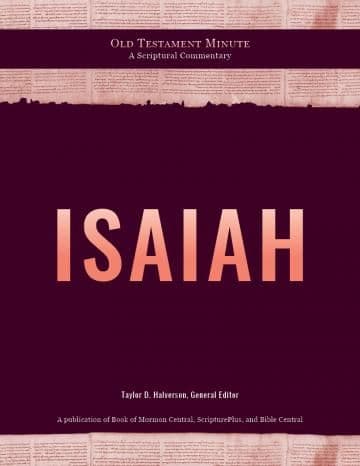Book
34 Chapters

There should not be a chapter break between chapters 29 and 30. The last verse of chapter 29 is hopeful; the first verse of chapter 30 warns the obstinate children of their consequences. They are characterized by those who make their own plans rather than focusing on God’s great Plan of Happiness.
30:2. This statement of Isaiah offers the example of going down to Egypt to look for Pharaoh’s protection, but Egypt, according to Isaiah 30:5, will bring them “neither help nor advantage.”
30:6. This verse describes a caravan making its way through the desert with riches on donkeys and treasures on the humps of camels to Egypt, whose help is utterly useless. “Therefore, I call her Rehab, the do nothing” (they who sit still).
30:10. The children say to the seers, “See not.” “Speak to us smooth things. Stop confronting us with the Holy One of Israel or the Messiah, who is Jesus Christ.” But Jesus said, “I am the Way.” President Nelson said, “Stay on the covenant path.”
30:13. The wall is a simile for sin. “Because you have rejected this message and relied on deceit, this sin will become for you like a high wall, bulging out, and about to collapse, whose crash comes suddenly, in an instant . . . among its pieces, not a fragment will be found.”
30:15. In the NIV, it reads, “This is what the Sovereign Lord, the Holy One of Israel, says: ‘In repentance and rest is your salvation, in quietness and trust is your strength, but you would have none of it.’”
30:17. This verse describes how those who have sinned will eventually flee away and be solitary as “a flagstaff on a mountaintop, a banner on a hill.” Let the metaphor speak to you.
30:18. This verse describes how a king in those days occasionally would rise in defense of justice when ordinarily, he was seated while his subjects bowed before him, waiting to be given his permission to stand.
30:19–22. These verses point out how gracious our God is when we cry for help. “As soon as he hears, he will answer you although the Lord gives you the bread of adversity and the water of affliction, your teachers will be hidden no more; with your own eyes you will see them. Whether you turn to the right or to the left, your ears will hear a voice behind you saying, ‘This is the way. Walk in it.’” Jesus said, “I am the way.”
30:23; “He will also send you rain for the seed you sow in the ground.” (In this land, there still, in our time, is a rainy season from April to October. If God withholds the rain at this time, the only way the crops can be watered is from the dew).
30:25; “In the day of the great slaughter, when the towers fall.” If you were asked what day was it that the towers fell in America, would your answer be September 11, 2001?
30:26. Compare the phrase “heals the wounds inflicted by his blow” (NRSV) to King Benjamin’s teachings that the Saints must be “willing to submit to all things which the Lord seeth fit to inflict upon him” (Mosiah 3:19). Verse 26 ends with a tender statement that the time will come “when Jehovah will bind up bruises and heal wounds.” The enabling Atonement is published abroad in our day. Could there be any more blessed healing than that? See also 2 Nephi 2:2 and Doctrine and Covenants 122.
30:29. Singing and the playing of instruments were part of Old Testament temple worship on holy days. A Jewish Passover is a good example of the night you celebrate an important festival by singing songs.
30:30. In addition, the Lord promises that we will hear His majestic voice and will make them see His arm and consuming fire (Isaiah 33:14).
30:33. In this verse, Topheth or Hinnom has long been prepared, it has been made ready for the king. “Its fire pit has been made deep and wide with an abundance of fire and wood. The breath of Jehovah like a stream of burning sulphur sets it ablaze.” Topheth, or Hinnom, was the valley south of Jerusalem where children were sacrificed by fire to the gods, including Molech. The power of the Lord is demonstrated dramatically when the metaphor speaks of his “breath” setting ablaze all the pagan altars in the valley of Topheth.
Book
34 Chapters
Items in the BMC Archive are made publicly available for non-commercial, private use. Inclusion within the BMC Archive does not imply endorsement. Items do not represent the official views of The Church of Jesus Christ of Latter-day Saints or of Book of Mormon Central.